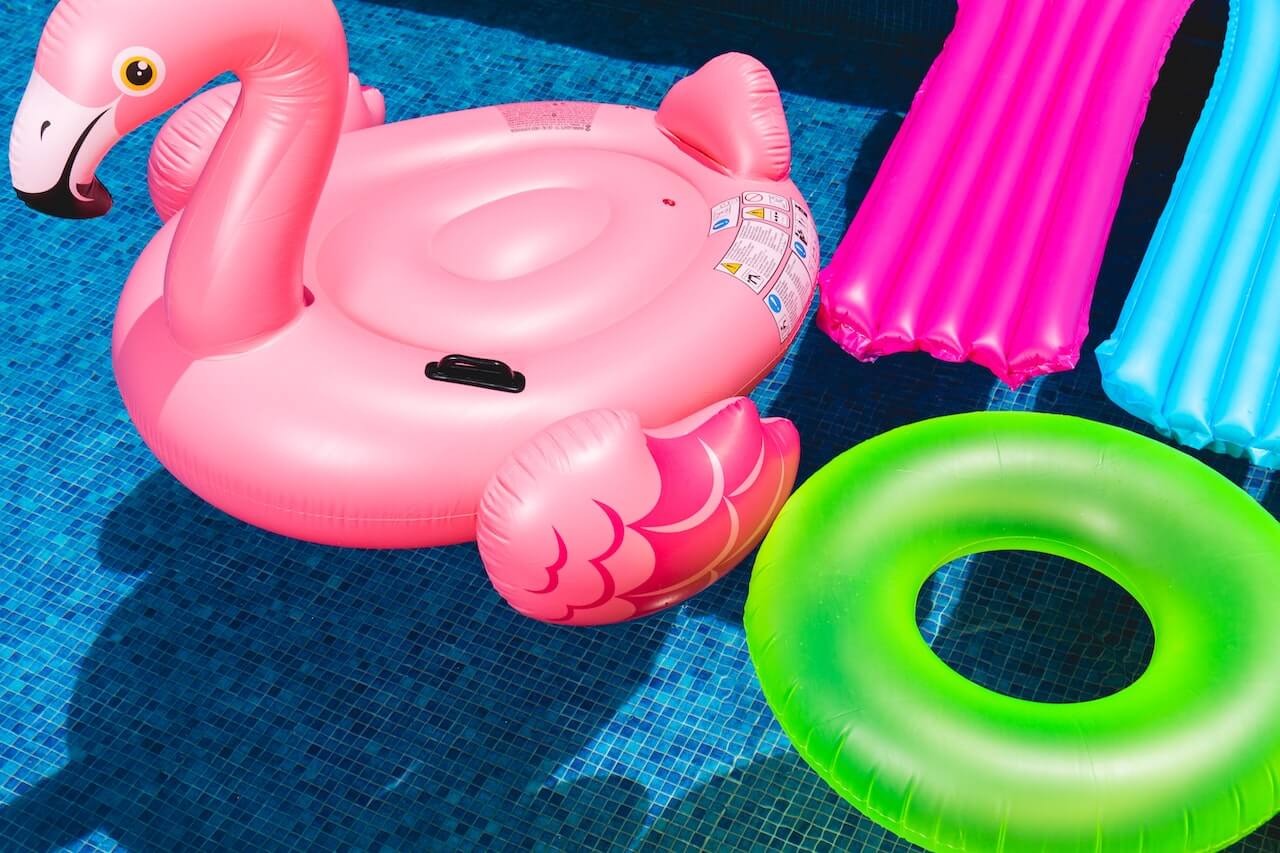As we gear up for another fun season of pool parties and beach getaways, some of the more environmentally-conscious among us have asked the question: are pool floats recyclable?
Pool floats bring joy and relaxation to our summer activities, but it’s essential to consider the environmental impact of these inflatables and how we can dispose of them responsibly.
Most pool floats are made from polyvinyl chloride (PVC), which are not recyclable. In this article, we will explore the recyclability of pool floats, why they can be difficult to recycle, and some eco-friendly alternatives and disposal methods you can consider.
Are Pool Floats Recyclable?
Pool floats are popular summer accessories for enjoying some fun in the water. However, the question of recyclability often emerges when it’s time to dispose of these inflatables.
Unfortunately, most pool floats are made of polyvinyl chloride (PVC), which has a recycling code of 3, indicating that it is NOT recyclable.
Items with recycling codes 1 and 2 are easily recyclable at most facilities, while those with codes 3 to 7 have varying degrees of recyclability, depending on the facility and the plastic’s condition.
The strength and durability of PVC, which are characteristics that make pool floats sturdy and long-lasting, also make it impossible to recycle.
Although the recyclability for pool floats is typically limited, some programs do accept them. For instance, the Funsicle Free Recycling Program by TerraCycle collects and processes inflatable pools and floats, which it then transforms into raw materials used for manufacturing new products.
To improve the sustainability of your pool gear, you can also explore sustainable pool floats made from eco-friendly materials, avoiding pools and water-related toys made from non-recyclable materials where possible.
Types of Pool Floats and Their Recyclability
Inflatable Pool Floats
 Inflatable pool floats are a popular choice due to their affordability and ease of use. They are typically made from PVC or vinyl materials, which cannot be recycled. Since recycling is not possible, consider repurposing old floats by cutting them into sheets or strips for various uses.
Inflatable pool floats are a popular choice due to their affordability and ease of use. They are typically made from PVC or vinyl materials, which cannot be recycled. Since recycling is not possible, consider repurposing old floats by cutting them into sheets or strips for various uses.
Foam Pool Floats
Foam pool floats are another common type of pool float, often made from closed-cell foam. These floats are more durable than inflatable options and provide excellent buoyancy.
They may be recyclable if they are made from foam materials like polyethylene or EVA foam. Contact your local recycling facility to determine if they accept these specific foam types for recycling.
Other Materials
Pool floats can also be made from other materials such as vinyl-coated fabrics, canvas, or mesh. The recyclability of these materials varies depending on the composition of the float.
Check for recycling symbols or refer to the manufacturer’s guidelines to determine the appropriate disposal methods for these pool floats. If recycling is not possible, consider donating the float to a local organization, repurposing it, or finding creative ways to upcycle the material.
The Recycling Process for Pool Floats
Recycling pool floats can be quite challenging because they are predominantly made of polyvinyl chloride (PVC) which is not accepted at most recycling facilities. Despite this difficulty, certain measures can be taken to give your old floats a new lease on life.
First and foremost, you can contact your local council or recycling center to see if they have the necessary facilities to process PVC items. Depending on the availability of services in your area, you may be able to recycle your pool floats.
In the event that your local recycling center cannot recycle PVC toys, there are still options for repurposing or reusing these pool accessories. Consider the following ideas:
- Use them as a beach or picnic blanket.
- Transform them into DIY projects or crafts, such as creating decorative pillows.
- Donate them to friends, family, or a local community group.
Ultimately, the key to reducing the environmental impact of pool floats lies in prolonging their lifespan and finding creative ways to reuse or repurpose them whenever possible.
Disposing of Non-Recyclable Pool Floats
Even though some pool floats are recyclable, others made of polyvinyl chloride (PVC) aren’t. However, there are other ways to responsibly dispose of non-recyclable pool floats and reduce their impact on the environment.
One option is to repurpose pool floats for other uses, such as making them into outdoor cushions, floating planters, or doormats. This can extend their life and prevent them from ending up in landfills. Additionally, you can try to repair any small punctures or damage so they can still be used.
Another way is to upcycle the materials by turning them into new products. There are companies which create accessories such as bags from inflatables, including pool floats and bouncy castles. You can support these businesses by sending in your old pool floats for their upcycling projects.
Lastly, consider donating non-recyclable pool floats to local schools, community centers, or non-profit organizations that focus on water safety or education. They may be able to repurpose the float or use it as part of their programs. Just make sure to contact them beforehand to check if they are accepting donations.
Environmentally Friendly Alternatives
While most pool floats can’t be recycled, there are eco-friendly alternatives available to reduce your carbon footprint. These sustainable options not only help the environment but are also durable and fun for summer pool enjoyment.
One option is to choose pool floats and toys made from polyethylene or EVA foam, which are considered more environmentally-friendly materials compared to PVC. These materials are designed to last a longer time, thus reducing waste.
Another way to ensure that you’re using eco-friendly pool toys is by selecting toys from brands that focus on sustainability. Check out this article which details various brands that offer stylish and sustainable alternatives to traditional pool accessories.
When it comes to floats, choose those that are designed to last. For example, the Swimline Deluxe Lounge Chair is a durable option that can withstand wear and tear longer than thin plastic alternatives, which are more likely to end up in a landfill.
Tips for Extending the Life of Pool Floats
Proper care and maintenance can significantly prolong the life of your pool floats, reducing waste and the need for frequent replacements. Follow these practical tips to keep your pool floats in great condition.
- Regular Cleaning: Clean your pool floats routinely using a solution of baking soda and water or a mild bleach solution. This will help to eliminate dirt, grime, and any buildup of algae or bacteria, and maintain the integrity of the material. Mix a 1/4 cup baking soda with a quart of water, or a tablespoon of bleach with a gallon of water. Scrub gently, rinse, and let it dry outside.
- Proper Inflation: Over-inflating or under-inflating your pool float can cause strain on the material and lead to punctures, leaks, or even bursting. Make sure to inflate the float according to the manufacturer’s instructions, typically until it’s firm but not overly tight.
- Repair Damages: If your pool float develops a hole, it’s often easy to fix. First, submerge the float in water to find where bubbles escape, indicating the hole’s location. Once found, thoroughly dry the float and repair it using a patch kit or vinyl repair adhesive.
- Proper Storage: When not in use, store your pool floats in a cool, dry, and shaded location, away from direct sunlight or extreme temperatures. Exposure to UV rays and heat can cause premature degradation of the material, shortening the float’s lifespan.
By following these simple tips, you can extend the life of your pool floats, ensuring you get the most use from them and reducing the need for disposal or recycling. Remember, a well-maintained pool float is not only eco-friendly but also saves you time and money in the long run.
Last update on 2024-07-13 / Affiliate links / Images from Amazon Product Advertising API


